 Petzlover
Petzlover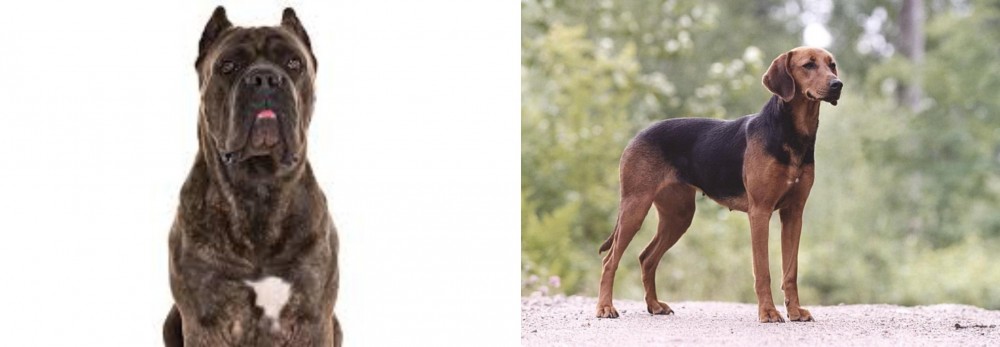 Cane Corso is originated from Italy but Schillerstovare is originated from Sweden. Cane Corso may grow 9 cm / 4 inches higher than Schillerstovare. Cane Corso may weigh 25 kg / 56 pounds more than Schillerstovare. Cane Corso may live 3 years less than Schillerstovare. Both Cane Corso and Schillerstovare has almost same litter size. Cane Corso requires Moderate Maintenance. But Schillerstovare requires Low Maintenance
Cane Corso is originated from Italy but Schillerstovare is originated from Sweden. Cane Corso may grow 9 cm / 4 inches higher than Schillerstovare. Cane Corso may weigh 25 kg / 56 pounds more than Schillerstovare. Cane Corso may live 3 years less than Schillerstovare. Both Cane Corso and Schillerstovare has almost same litter size. Cane Corso requires Moderate Maintenance. But Schillerstovare requires Low Maintenance
 As a descendant of the Canis pugnax, the Cane Corso dog which hails from Italy has been used for guarding livestock and property. The Corso’s lineage goes far back to ancient Roman times, with the name of dog actually meaning bodyguard dog.
As a descendant of the Canis pugnax, the Cane Corso dog which hails from Italy has been used for guarding livestock and property. The Corso’s lineage goes far back to ancient Roman times, with the name of dog actually meaning bodyguard dog.
As life changed in Italy, the Corso became more rare so that some enthusiasts of the breed began to look at helping the dog recover from the brink of extinction. By 1994, the breed was accepted by the Italian Kennel Club and the dog was also recognized internationally, with the American Kennel Club recognizing the Cane Corso in 2010.
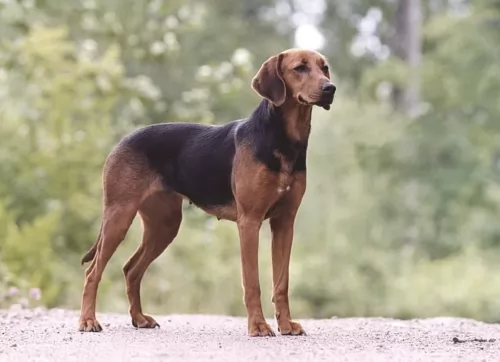 The Schillerstövare originated in Sweden, being named after a Swedish farmer, Per Schiller. After he died, the dog was named Schillerstövare in 1907, and was Sweden's first native dog breed.
The Schillerstövare originated in Sweden, being named after a Swedish farmer, Per Schiller. After he died, the dog was named Schillerstövare in 1907, and was Sweden's first native dog breed.
The Swedish Kennel Club recognised this dog in 1907 and it is also recognised by the Federation Cynologique Internationale as well as a number of minor kennels and dog clubs.
The dog has always been used as a hunting dog and the English Foxhound is the e foundation for this breed.
 The Cane Corso is a large dog which hails from Italy. He is a molosser. The dog is muscled and is somewhat less bulkier than other Mastiff breeds. He is 64-70 cm in height and he weighs 45-50 kg.
The Cane Corso is a large dog which hails from Italy. He is a molosser. The dog is muscled and is somewhat less bulkier than other Mastiff breeds. He is 64-70 cm in height and he weighs 45-50 kg.
The head of the Cane Corso is large and the ears are cropped and stand erect. The tail is also traditionally docked to give the dog a distinctive look, but these days, with regulations regarding tail docking, the dog can also be seen with a full tail.
The Corso has a short coat which comes in fawn shades, gray, red, brindle or black shades. White markings are common on the chest, chin, toes and sometimes on the nose.
The Corso is a working dog who needs lots of mental and physical stimulation. He’s an inquisitive dog who is confident and ready to meet life as it comes. He’ll want a strong, firm owner with leadership qualities. He'll require training and socialization and then he becomes an affectionate, obedient pet who gets on well with all members of the family as well as other pets. He is a highly intelligent dog and responds well to training.
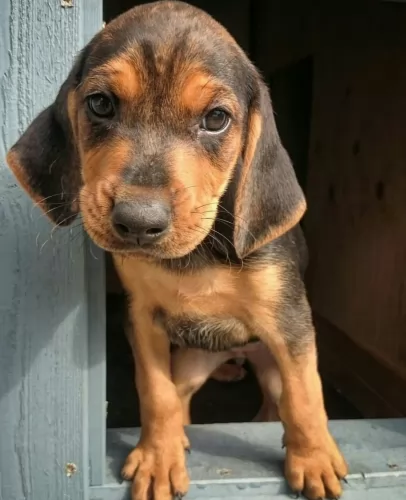 The Schillerstövare is a medium to large sized dog. They’re athletic and muscular.
The Schillerstövare is a medium to large sized dog. They’re athletic and muscular.
Standing at between 53–61cm in height and weighing in the region of 18–25kg, the coat of the dog is fairly short and harsh, with the color being black and tan.Sometimes you’ll see some white markings on the chest and paws.
The head is domed, the eyes brown, bright and alert and the ears of the dog are broad, medium length and floppy. The long tail is carried low or held out when running or alert.
If you allow your Schillerstovare to have puppies, you can expect between 3 to 7.
The Schillerstovare is a calm dog but he can get petty lively when there’s a game to be had. He gets on well with well disciplined children who have been taught to be kind and respectful to animals. He also gets on well with pets in the home. Just like with most other dogs, he will need to be trained and socialized as he is a strong willed, confident, dominant dog.
He is friendly and active but will be somewhat reserved around strangers.These dogs will require a lot of exercise and will need quite a bit of space too. They aren't well suited to small properties in the city. He will need a daily walk but also a chance to get off his leash and run free in the park. Other forms of exercise such as hikes, ball game and swimming will delight him.
 The Cane Corso is known for his agility and athleticism. He is full of energy and he also wants lots of attention and companionship from his human family. With proper training and socialization his temperament changes so that he becomes a super friend and companion while also being protective.
The Cane Corso is known for his agility and athleticism. He is full of energy and he also wants lots of attention and companionship from his human family. With proper training and socialization his temperament changes so that he becomes a super friend and companion while also being protective.
The dog is attentive and receptive to training. The way a dog turns out is essentially what the owners are like, and many Cane Corso dogs have been blamed for being aggressive because they’ve been brought up by aggressive, abusive and irresponsible owners.
The Cane Corso is a large dog with an exuberant nature and who expresses his joy by snorting, wheezing, grunting and slobbering. Treat him well as a family member and you’re going to have a wonderful friend and protector.
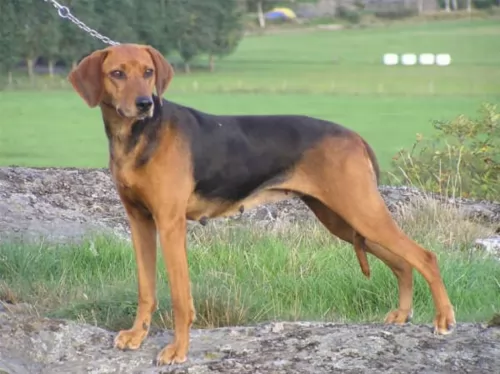 Schillerstovares are social, loving, friendly, loyal dogs who enjoy being around their human family. He’s going to need a lot of exercise, both mental and physical to keep him from boredom and frustration.
Schillerstovares are social, loving, friendly, loyal dogs who enjoy being around their human family. He’s going to need a lot of exercise, both mental and physical to keep him from boredom and frustration.
He will rely on you for at least a daily walk. He is strong-will and confident and will do well in a family where they are active and where they are firm, patient, kind and consistent in their behaviour towards him because then he ticks all th right boxes for being a splendid pet.
 The life expectancy of the Cane Corso is 10 to 12 years. He is a large, healthy dog breed, but all large dogs are inclined towards bone and joint problems which includes hip dysplasia. Your Cane Corso is also prone to eye defects.
The life expectancy of the Cane Corso is 10 to 12 years. He is a large, healthy dog breed, but all large dogs are inclined towards bone and joint problems which includes hip dysplasia. Your Cane Corso is also prone to eye defects.
Strangely, dogs have 3 eyelids, with the third eyelid being home to tear producing gland. There are some dogs where the ligament fails so that the gland pops out, looking like a cherry stuck at the inner corner of the eye. The veterinarian will be able to perform surgery to attach the gland back.
There are dogs where the eyelids roll inwards. Entropion causes hair to rub on the surface of the eye, resulting in pain and also damage to the cornea. Sometimes surgery will be necessary to fix the eyelid.
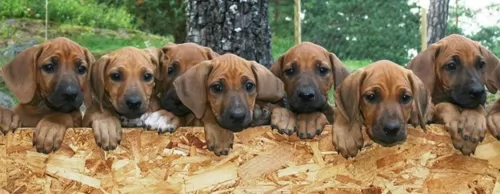 Even though your Schillerstovare is a healthy dog breed, hip dysplasia is a common dog disease that many dogs get.
Even though your Schillerstovare is a healthy dog breed, hip dysplasia is a common dog disease that many dogs get.
This is a skeletal disease when a dog’s hip joints become partially dislocated. It can be very difficult for your dog to get around, and he can also develop arthritis. It gets very sad when your dog doesn’t even want to participate in games anymore.
 The short coat sheds fairly heavily twice a year. His coat will certainly need a brush twice a week but during shedding time it will be more often if you want to avoid your home being full of hair. As you brush, its the chance to check for fleas, ticks and skin infections.
The short coat sheds fairly heavily twice a year. His coat will certainly need a brush twice a week but during shedding time it will be more often if you want to avoid your home being full of hair. As you brush, its the chance to check for fleas, ticks and skin infections.
Brush your Cane Corso’s teeth at least 2 or 3 times a week to remove tartar build-up. If you don’t there is the problem of bacteria which can result in gum disease, bad breath and tooth loss.
Your Cane Corso is a large, active dog and will therefore require a high quality food for his breed type. The type of food your dog eats will depend on his age and his activity levels.
The quality of dog food is highly important as it is a contributing factor towards his health. Always try to give your dog some home-made food such as vegetables, rice and meat. Include some raw meat into his diet from time to time as a dog is a carnivore, and raw meat in his diet will help to stave off skin problems. Never forget to check that he has fresh, cool water around the clock.
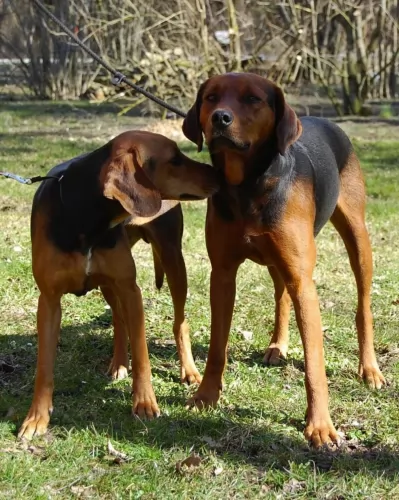 With his short coat, the Schillerstovare is considered a low maintenance dog and requires a minimal amount of grooming. Brushing should be done twice a week to remove loose hair. The harsh outer coat seems to repel dirt and dust.
With his short coat, the Schillerstovare is considered a low maintenance dog and requires a minimal amount of grooming. Brushing should be done twice a week to remove loose hair. The harsh outer coat seems to repel dirt and dust.
Trim your pet’s nails, check inside his ears for signs of redness, make sure his eyes are bright and clear and make sure he doesn’t have any unusual lumps on him.
Make sure his vaccines are up to date to avoid deadly canine diseases. Take him to the vet when you suspect he isn’t his normal self.
Dogs, just like humans, do well on good, nutritious diets. Feed a human lots of junk food and sweets and they’ll grow up to be obese and unhealthy. That's exactly how it is with dogs too. Some of the best commercially manufactured dog foods are convenient and they can be good if you look at the top brands. Look for ones that cater for your dog’s age, size, breed and activity levels. This dry kibble can be made more inviting for your pet when you include some homemade food.
Dogs just want simplicity so that they don’t battle with digestive problems. Boiled chicken, sweet potatoes, brown rice or pasta, carrots and spinach will be wonderful for him when you chop the food up and add it into the dry kibble twice a week. See his tail wag and his brown eyes light up when he smells this treat. Some raw meat added up occasionally will also contribute to your pet’s heath.
Make sure he is never without a constant supply of fresh, cool water.